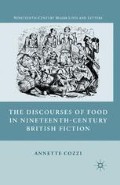Abstract
Dusty, hot, and thirsty, Michael Henchard stops for a drink at the furmity woman’s tent, and there he sells his wife. This drunken act committed by Henchard, the itinerant hay-trusser who will become mayor of Casterbridge, at the obsolescent Weydon-Priors Fair, is one of the last vestiges of a pre-industrial England, representing an agricultural identity that will be not only uprooted and transplanted, but also mythologized and memorialized in the construction of a modernized and bureaucratized national identity. Both Thomas Hardy in The Mayor of Casterbridge (1886) and Benjamin Disraeli in Sybil (1845) romanticize the past, but whereas Hardy recalls multiple histories that cannot be revived, merely remembered, Disraeli looks to a particular past to envision a future in which England staves off change by restraining the growth of industrial capitalism and reverting to its feudal and agricultural roots. Both The Mayor of Casterbridge and Sybil are set in rural England during the turbulent years before the 1846 repeal of the Corn Laws. I identify repeal of these import tariffs on the price of grain, intended to protect agrarian landowners, as one of the most significant turning points in the construction of imperial national identity.
Alas, the country! how shall tongue or pen
Bewail her now uncountry gentlemen?
The last to bid the cry of warfare cease,
The first to make a malady of peace.
For what were all these country patriots born?
To hunt, and vote, and raise the price of corn?
—Byron, The Age of Bronze, Canto XIV, 1823
Dear Sugar, dear Tea, and dear Corn
Conspired with dear Representation
To laugh worth and honor scorn
And beggar the whole British nation.
—Ebenezer Elliot, “The Four Dears,” 1833
Access this chapter
Tax calculation will be finalised at checkout
Purchases are for personal use only
Preview
Unable to display preview. Download preview PDF.
Notes
Thomas Hardy, The Life and Death of the Mayor of Casterbridge. The Story of a Man of Character (New York: Putnam, 1999), 11.
Dorothy Hartley’s Food in England (London: Futura, 1954), 505.
Piero Camporesi’s Bread of Dreams: Food and Fantasy in Early Modern Europe (Chicago: U of Chicago P, 1989).
Eric Hobsbawm, Nations and Nationalism Since 1780: Programme, Myth, Reality (Cambridge: Cambridge UP, 1990), 14.
Tom Nairn, Faces of Nationalism: Janus Revisited (London: Verso, 1997), 9.
Maggie Black, Food & Cooking in 19th Century Britain (London: English Heritage, 1985), 5.
Reay Tannahill, Food in History (New York: Stein and Day, 1973), 330.
Donald Grove Barnes, A History of the English Corn Laws from 1660–1846 (New York: Augustus M. Kelley, 1961), 240.
Benedict Anderson, Imagined Communities (London: Verso, 1983), 204.
Elizabeth Gaskell’s North and South (London: Oxford UP, 1973).
Benjamin Disraeli, Sybil (Oxford: Oxford UP, 1998), 66.
Todd M. Endelman and Tony Kushner, eds., Disraeli’s Jewishness (London: Valentine Mitchell, 2002);
Anthony S. Wohl’s “‘Dizzi-Ben-Dizzi’: Disraeli as Alien,” Journal of British Studies 34:3 (July 1995): 375–411.
Richard G. Weeks, Jr.’s “Disraeli as Political Egotist: A Literary and Historical Investigation,” Journal of British Studies 28:4 (Oct. 1989): 387–410;
Charles Richmond and Paul Smith, eds., The Self-Fashioning of Disraeli, 1818–1851 (Cambridge: Cambridge UP, 1999).
Daniel Bivona’s “Disraeli’s Political Trilogy and the Antinomic Structure of Imperial Desire,” Novel: A Forum on Fiction 22:3 (Spring 1989): 305–325
R. C. K. Ensor, England, 1870–1914: The Oxford History of England (Clarendon: Oxford UP, 1936), 115–117.
According to W. Hamish Fraser in The Coming of the Mass Market (Hamden, Connecticut: Archon Books, 1981)
Jakob Lothe’s “Variants on genre” or George Levine’s “The Mayor of Casterbridge: Reversing the Real,” both in Critical Essays on Thomas Hardy: The Novels, ed. Dale Kramer (Boston: G.K. Hall&Co., 1990).
see Williams’s chapter “Wessex and the Border” in The Country and the City (London: The Hogarth Press, 1985).
Elizabeth K. Helsinger, Rural Scenes and National Representation (Princeton: Princeton UP, 1997), 13.
J. Hillis Miller’s “The Mayor of Casterbridge, the Persistence of the Past, and the Dance of Desire,” Thomas Hardy: Distance and Desire (Cambridge: Cambridge UP, 1970).
Michael Valdez Moses in Contemporary Critical Essays on Thomas Hardy: The Novels, ed. Dale Kramer (Boston: G.K. Hall&Co., 1990).
Copyright information
© 2010 Annette Cozzi
About this chapter
Cite this chapter
Cozzi, A. (2010). Corn Kings: Disraeli, Hardy, and the Reconciliation of Nations. In: The Discourses of Food in Nineteenth-Century British Fiction. Nineteenth-Century Major Lives and Letters. Palgrave Macmillan, New York. https://doi.org/10.1057/9780230117525_2
Download citation
DOI: https://doi.org/10.1057/9780230117525_2
Publisher Name: Palgrave Macmillan, New York
Print ISBN: 978-1-349-28884-7
Online ISBN: 978-0-230-11752-5
eBook Packages: Palgrave Literature CollectionLiterature, Cultural and Media Studies (R0)

